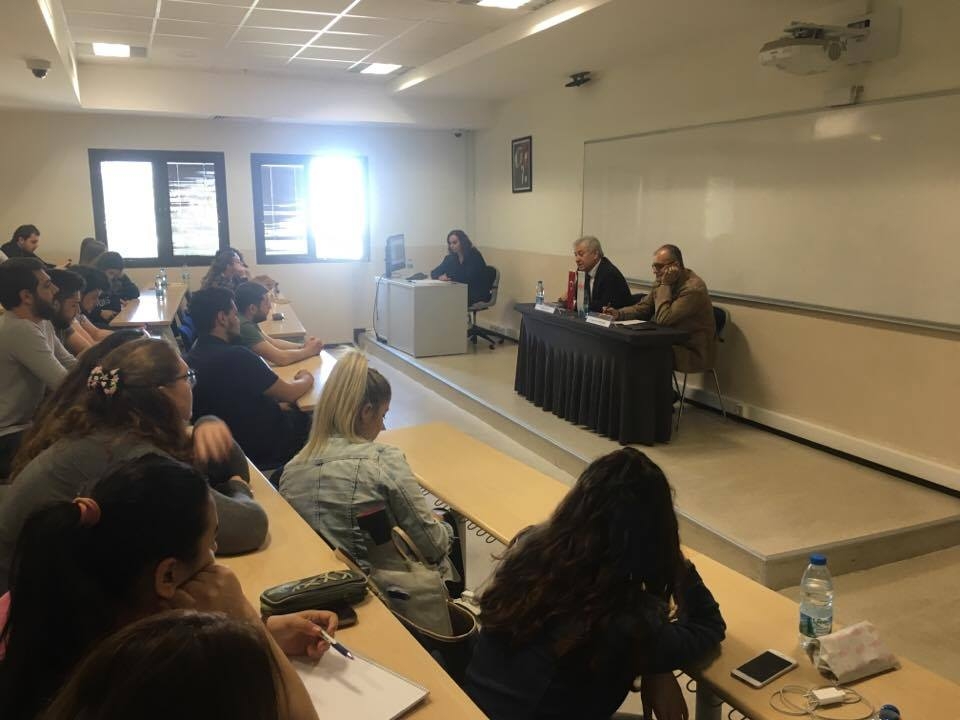
...
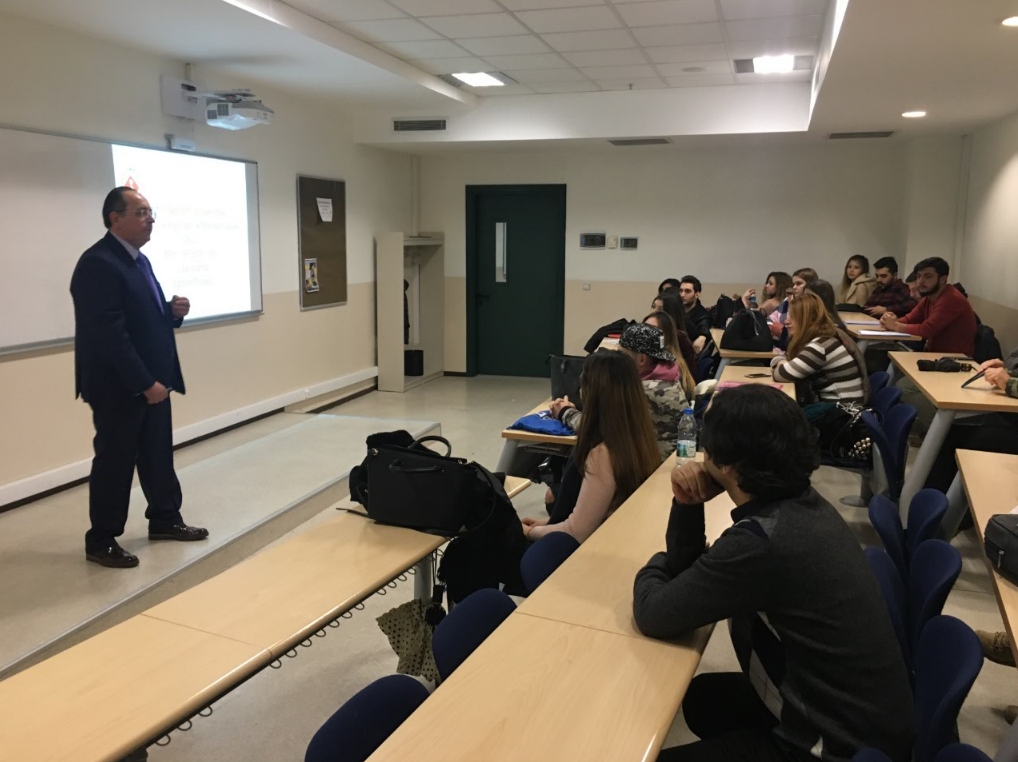
...
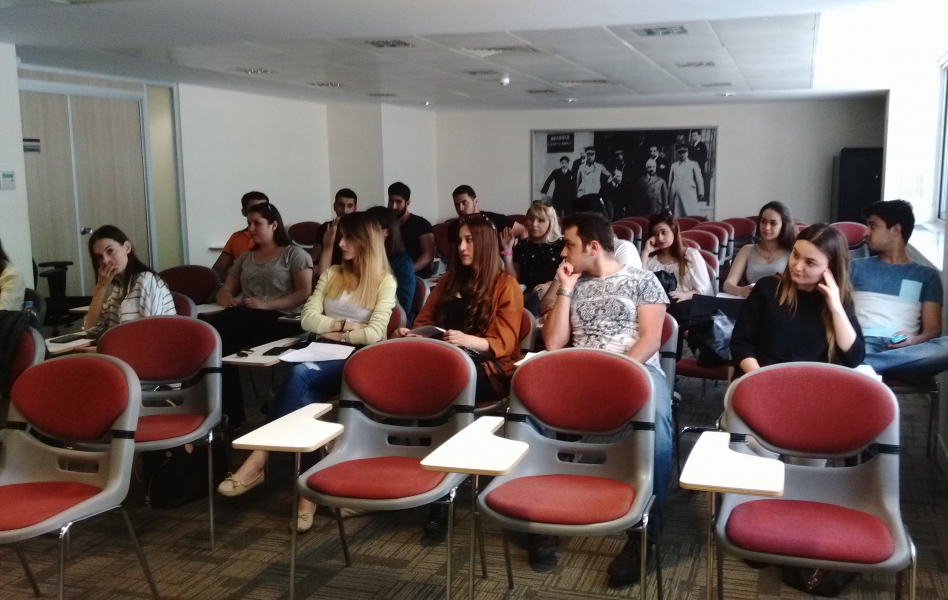
...
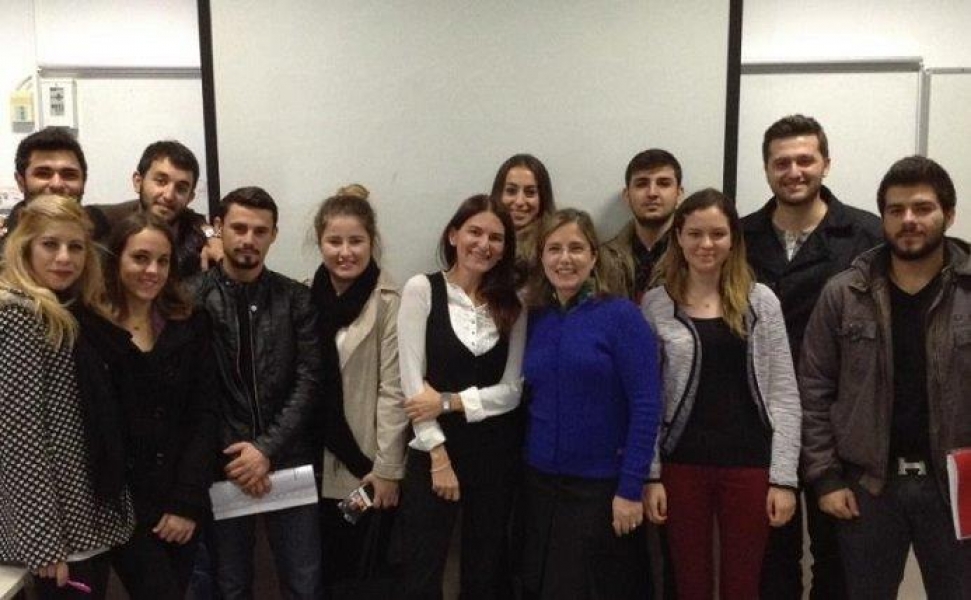
...
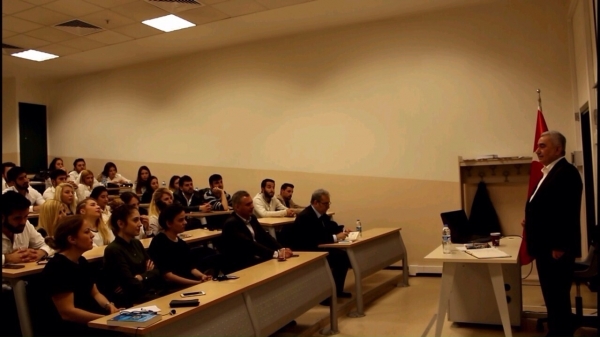
...

...
| Course Name |
Turkish I
|
|
Code
|
Semester
|
Theory
(hour/week) |
Application/Lab
(hour/week) |
Local Credits
|
ECTS
|
|
TRK 101
|
Fall/Spring
|
2
|
0
|
2
|
1
|
| Prerequisites |
None
|
|||||
| Course Language |
Turkish
|
|||||
| Course Type |
Service Course
|
|||||
| Course Level |
First Cycle
|
|||||
| Mode of Delivery | - | |||||
| Teaching Methods and Techniques of the Course | DiscussionQ&ALecture / Presentation | |||||
| National Occupation Classification | - | |||||
| Course Coordinator | ||||||
| Course Lecturer(s) | ||||||
| Assistant(s) | - | |||||
| Course Objectives | The objective of this course is to show the students characteristics and rules of Turkish Language through examples; make them achieve the habit and skill of showing their emotions, thoughts, plans, impressions, observations, and experiences accurately and efficiently in writing and verbally; develop their vocabulary with the help of written and verbal texts; teach them the rules of comprehending accurately the texts they read or programs they listen to; develop their language skills which form the basis of the communication between individuals and populace. At the end of this course students will be able to: |
| Learning Outcomes |
The students who succeeded in this course;
|
| Course Description | Students will be taught how to use the written communication tools accurately and efficiently in this course. Various types of written statements will be examined through a critical point of view by doing exercises on understanding, telling, reading, and writing. Punctuation and spelling rules, which are basis of written statement, will be taught and accurate usage of these rules for efficient and strong expression will be provided. |
| Related Sustainable Development Goals |
|
|
Core Courses | |
| Major Area Courses | ||
| Supportive Courses | ||
| Media and Management Skills Courses |
X
|
|
| Transferable Skill Courses |
| Week | Subjects | Related Preparation |
| 1 | Communication | Yakıcı, A., Yücel, M., (...)&Yelok,S. (2010). Türk Dili ve Kompozisyon Bilgileri, Yargı Publishing House, Ankara, p. 1-7 |
| 2 | Elements of Communication | Yakıcı, A., Yücel, M., (...)&Yelok,S. (2010). Türk Dili ve Kompozisyon Bilgileri, Yargı Publishing House, Ankara, p. 8-16 |
| 3 | Languages on World | Yakıcı, A., Yücel, M., (...)&Yelok,S. (2010). Türk Dili ve Kompozisyon Bilgileri, Yargı Publishing House, Ankara, p. 39-47 |
| 4 | The Place of Turkish Among World Languages | Yakıcı, A., Yücel, M., (...)&Yelok,S. (2010). Türk Dili ve Kompozisyon Bilgileri, Yargı Publishing House, Ankara, p. 48-56 |
| 5 | Culture and Elements of Culture | Yakıcı, A., Yücel, M., (...)&Yelok,S. (2010). Türk Dili ve Kompozisyon Bilgileri, Yargı Publishing House, Ankara, p. 48-56 |
| 6 | Culture Types and Language Culture Relationship | Yakıcı, A., Yücel, M., (...)&Yelok,S. (2010). Türk Dili ve Kompozisyon Bilgileri, Yargı Publishing House, Ankara, p. 27-33 |
| 7 | Spelling Rules (Correctional Mark, Writing Some Words and Attachments, Where Lowercase Letters Are Used, Where Capital Letters Are Used) | Yakıcı, A., Yücel, M., (...)&Yelok,S. (2010). Türk Dili ve Kompozisyon Bilgileri, Yargı Publishing House, Ankara, p. 147-165 |
| 8 | Spelling Rules (Correctional Mark, Writing Some Words and Attachments, Where Lowercase Letters Are Used, Where Capital Letters Are Used) | Yakıcı, A., Yücel, M., (...)&Yelok,S. (2010). Türk Dili ve Kompozisyon Bilgileri, Yargı Publishing House, Ankara, p. 147-165 |
| 9 | Punctuation Marks | Yakıcı, A., Yücel, M., (...)&Yelok,S. (2010). Türk Dili ve Kompozisyon Bilgileri, Yargı Publishing House, Ankara, p. 48-56 |
| 10 | Punctuation Marks | Yakıcı, A., Yücel, M., (...)&Yelok,S. (2010). Türk Dili ve Kompozisyon Bilgileri, Yargı Publishing House, Ankara, p. 48-56 |
| 11 | Composition and Forms of Expression | Yakıcı, A., Yücel, M., (...)&Yelok,S. (2010). Türk Dili ve Kompozisyon Bilgileri, Yargı Publishing House, Ankara, p. 229-243 |
| 12 | Types of Writing (Official "Formal" Articles: Petition, Record, Decision) | Yakıcı, A., Yücel, M., (...)&Yelok,S. (2010). Türk Dili ve Kompozisyon Bilgileri, Yargı Publishing House, Ankara, p. 245-292 |
| 13 | Writing Types (Official "Formal" Articles: Report, Business Letters, CV) | Yakıcı, A., Yücel, M., (...)&Yelok,S. (2010). Türk Dili ve Kompozisyon Bilgileri, Yargı Publishing House, Ankara, p. 245-292 |
| 14 | Types of Writing: Articles Transmitting Thoughts and Information: Clause, Article, Criticism, Essay, Letter…) | Yakıcı, A., Yücel, M., (...)&Yelok,S. (2010). Türk Dili ve Kompozisyon Bilgileri, Yargı Publishing House, Ankara, p. 357-404 |
| 15 | Semester Review | |
| 16 | Final Exam |
| Course Notes/Textbooks | Yakıcı, A., Yücel, M., (...)&Yelok,S. (2010). Türk Dili ve Kompozisyon Bilgileri, Yargı Publishing House, Ankara. |
| Suggested Readings/Materials | Korkmaz, Z. (2003). Türk Dili ve Kompozisyon Bilgileri, 6. Baskı, Ankara:YargıYayınevi.. |
| Semester Activities | Number | Weigthing |
| Participation | ||
| Laboratory / Application | ||
| Field Work | ||
| Quizzes / Studio Critiques |
2
|
30
|
| Portfolio | ||
| Homework / Assignments | ||
| Presentation / Jury |
-
|
-
|
| Project | ||
| Seminar / Workshop | ||
| Oral Exams | ||
| Midterm |
1
|
30
|
| Final Exam |
1
|
40
|
| Total |
| Weighting of Semester Activities on the Final Grade |
3
|
60
|
| Weighting of End-of-Semester Activities on the Final Grade |
1
|
40
|
| Total |
| Semester Activities | Number | Duration (Hours) | Workload |
|---|---|---|---|
| Theoretical Course Hours (Including exam week: 16 x total hours) |
16
|
2
|
32
|
| Laboratory / Application Hours (Including exam week: '.16.' x total hours) |
16
|
0
|
|
| Study Hours Out of Class |
10
|
1
|
10
|
| Field Work |
0
|
||
| Quizzes / Studio Critiques |
2
|
2
|
4
|
| Portfolio |
0
|
||
| Homework / Assignments |
0
|
||
| Presentation / Jury |
-
|
-
|
0
|
| Project |
0
|
||
| Seminar / Workshop |
0
|
||
| Oral Exam |
0
|
||
| Midterms |
1
|
6
|
6
|
| Final Exam |
1
|
10
|
10
|
| Total |
62
|
|
#
|
Program Competencies/Outcomes |
* Contribution Level
|
|||||
|
1
|
2
|
3
|
4
|
5
|
|||
| 1 |
To be able to develop themselves in the subjects of obtaining the financial resources necessary for the activities of individuals and enterprises under the most favorable conditions and examining the use of the accumulated funds. |
-
|
-
|
-
|
-
|
-
|
|
| 2 |
To be able to discuss the role, importance and functions of the institutions providing banking and insurance services in the economic system |
-
|
-
|
-
|
-
|
-
|
|
| 3 |
To be able to evaluate the organizational structure, business processes, and service portfolios of banks, insurance companies, and other financial institutions operating in the sector. |
-
|
-
|
-
|
-
|
-
|
|
| 4 |
To be able to develop skills in identifying, measuring, and assessing financial and operational risks, and to acquire fundamental knowledge to understand and apply insurance products against these risks. |
-
|
-
|
-
|
-
|
-
|
|
| 5 |
To be able to recognize financial products offered in the banking and insurance sector, and to gain skills in effective marketing and sales, as well as managing long-term customer relationships. |
-
|
-
|
-
|
-
|
-
|
|
| 6 |
To be able to possess basic legal knowledge and closely monitor legislative changes relevant to the field. |
-
|
-
|
-
|
-
|
-
|
|
| 7 |
To be able to possess basic knowledge of accounting and analyze financial statements to evaluate the financial status of businesses. |
-
|
-
|
-
|
-
|
-
|
|
| 8 |
To be able to follow technological innovations in the financial sector and acquire knowledge about the role of blockchain and artificial intelligence applications in the industry. |
-
|
-
|
-
|
-
|
-
|
|
| 9 |
To be able to make decisions based on the principles of professional ethics, accountability and responsibility |
-
|
-
|
-
|
-
|
-
|
|
| 10 |
To be able to follow international financial markets and global economic indicators by using English at least at the A2 level of the "European Language Portfolio" |
-
|
-
|
-
|
-
|
-
|
|
| 11 |
To be able to analyze and interpret banking and insurance data, and to develop data-driven strategies for financial decision-making. |
-
|
-
|
-
|
-
|
-
|
|
| 12 |
To be able to acquire knowledge about the components of national and international systems and the implementation of sector policies. |
-
|
-
|
-
|
X
|
-
|
|
| 13 |
To be able to direct his/her education to a further level of education |
-
|
-
|
-
|
-
|
-
|
|
*1 Lowest, 2 Low, 3 Average, 4 High, 5 Highest

...

...

...

...

...

...

As Izmir University of Economics transforms into a world-class university, it also raises successful young people with global competence.
More..Izmir University of Economics produces qualified knowledge and competent technologies.
More..Izmir University of Economics sees producing social benefit as its reason for existence.
More..